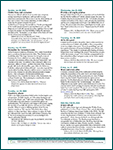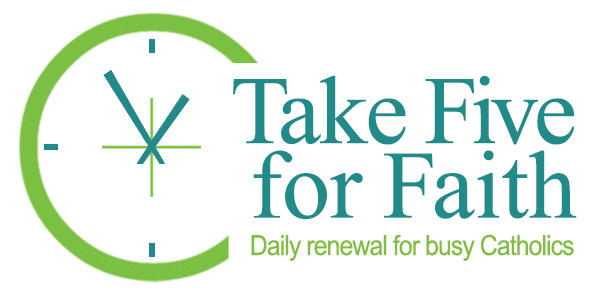|
Dear Take Five for Faith subscriber, here is your reflection for today...
Week beginning
September 21, 2025 |
|
|
| Sunday, September 21 |
| TWENTY-FIFTH SUNDAY IN ORDINARY TIME |
| Set an intention |
| Most of us know intuitively what prayer is, but how do we pray at all times and “in every place,” as scripture says? One way is to set an intention for each task before us. For example, we might pray: “May this report I am writing be a sign of gratitude for my job.” Or: “May these dishes I am washing be a sign of my love for my family.” Or: “May this cover letter and résumé be a sign of my hope for the future.” By setting an intention for each part of our day, we become more fully aware of our relationship to God. Our actions become steeped with meaning and therefore more loving, peaceful, and compassionate. And isn’t that what prayer is for? |
| Today's readings: Amos 8:4-7; 1 Timothy 2:1-8; Luke 16:1-13 or Luke 16:10-13 (135). “I ask that supplications, prayers, petitions, and thanksgivings be offered for everyone.” |
|
|
| EN ESPAÑOL |
| |
| Domingo, 21 de septiembre |
| VIGÉSIMO QUINTO DOMINGO EN TIEMPO ORDINARIO |
| Establecer una intención |
| La mayoría de nosotros sabe intuitivamente lo que es la oración, pero ¿cómo oramos a todas horas y “en todo lugar”, como dice la escritura? Una manera es poner una intención por cada tarea ante nosotros. Por ejemplo, podemos orar: “Que este reporte que estoy escribiendo sea una señal de gratitud por mi trabajo.” O: “Que estos platos que estoy lavando sean una señal de amor por mi familia.” O: “Que esta carta de presentación y currículum sean una señal de mi esperanza por el futuro.” Al poner una intención por cada parte de nuestro día, llegamos a ser más completamente conscientes de nuestra relación con Dios. Nuestras acciones se vuelven altamente significativas y por lo tanto más amorosas, pacíficas, y compasivas. ¿Y no es para eso la oración? |
| Lecturas del día: Amos 8:4-7; 1 Timoteo 2:1-8; Lucas 16:1-13 o Lucas 16:10-13 (135). “Te ruego … que ante todo se hagan oraciones, plegarias, súplicas y acciones de gracias por todos los hombres.” |
|
|
|
|
Monday, September 22
|
| Shine your quantum light |
| In her Revelations of Divine Love, 14th-century mystic Julian of Norwich describes how she came to understand that God is light, “our endless Day.” Seven centuries later, physicist Bernard Haisch came to the same understanding: “The solid, stable world of matter appears to be sustained at every instant by an underlying sea of quantum light,” which Haisch concludes gives “Let there be light” profound meaning and a clue to the nature of God and the mysteries of the universe. The light that shines within you is God. Let others see that light in everything you do. |
| Today's readings: Ezra 1:1-6; Luke 8:16-18 (449). "No one who lights a lamp conceals it with a vessel or sets it under a bed; rather, he places it on a lampstand.” |
|
|
| Tuesday, September 23 |
| MEMORIAL OF PIUS OF PIETRELCINA, PRIEST |
| Suffering through the eyes of love |
| Pope John Paul II canonized Padre Pio of Pietrelcina on June 16, 2002. More than 300,000 people braved excessive heat to fill St. Peter’s Square and nearby streets for the ceremony. They heard the Holy Father praise the new saint for his prayer and charity and for Padre Pio’s witness to the power of suffering. If accepted with love, the pope stressed, such suffering can lead to “a privileged path of sanctity.” There is meaning in the suffering in your own life. Search for it with a loving gaze. |
| Today's readings: Ezra 6:7-8, 12b, 14-20; Luke 8:19-21 (450). “My mother and my brothers are those who hear the word of God and act on it.” |
|
|
| Wednesday, September 24 |
| Help freedom reign |
| The church has not always been on the right side of history when it comes to slavery. In fact, for centuries the “right side” meant justifying slavery because it was an accepted social institution. The ancient Israelites were enslaved people, and the early Christians—and lots of Christians afterwards—took it for granted. Judaism, however, believed the law of God protected enslaved people from mistreatment, and early Christianity thought the differences between enslavers and the enslaved evaporated in the kingdom of God. While just about all people of faith today reject slavery outright, it is still very much alive in forms like human trafficking. A number of Catholic women’s religious communities are involved in the fight against trafficking. Learn more about what you can do to bring freedom and justice to enslaved people. |
| Today's readings: Ezra 9:5-9; Luke 9:1-6 (451). “For slaves we are, but in our servitude our God has not abandoned us.” |
|
|
| Thursday, September 25 |
| Gains and losses redefined |
| The people of Israel, it seems, had more important things to do than rebuild the temple of the Lord—there was wealth to be made, food and drink and fine clothes to enjoy, and comfortable homes to build. Recent economic history echoes this pattern: Vast fortunes have been amassed, often at the expense of basic moral and ethical principles. In both prosperity and hardship, the divine call to justice, mercy, and love remains unchanged. If you seek lasting joy, disregard the shifting trends of society, and follow the eternal values God sets before us. As Saint Theresa of Ávila reminds us: “Our greatest gain is to lose the wealth that is of such brief duration and, by comparison with eternal things, of such little worth.” |
| Today's readings: Haggai 1:1-8; Luke 9:7-9 (452). “You have sown much, but have brought in little.” |
|
|
| Friday, September 26 |
| Treasure the word |
| Considering the enormous flow of words we can encounter with nothing more than the movement of a finger on a computer screen, it is difficult to imagine the ordeal required for a library in the Middle Ages to acquire even a single new book. Monks would often spend their entire careers traveling between monasteries and at each stop transcribing by hand whatever text their home library was in want of. The English monk Saint Ceolfrith (642-716) was renowned in his time for his tortuous travels and prolific transcribing efforts. His protégé, the famous Saint Bede, writes that Ceolfrith alone doubled the holdings of their monastery’s library, which was already considered sizeable. Draw on the wisdom of ancient monks as you contemplate how can you expand the treasury of God’s word today. |
| Today's readings: Haggai 2:1-9; Luke 9:18-22 (453). “Take courage, all you people of the land, says the LORD, and work! For I am with you.” |
|
|
| Saturday, September 27 |
| Improve your attention span |
| The early 20th-century French philosopher and mystic Simone Weil had much to say about the value of attention. “Attention is the highest and purest form of generosity,” she said. “Prayer is made of attention.” “There is never a case when an effort of attention is lost. It will always be spiritually effective.” Learning to pay attention—to focus and concentrate on what is at hand—is and has been a neglected practice. No doubt multitudes who lived at the time of Jesus rushed right by him as he preached in the synagogues and healed in the streets, too caught up in the day’s affairs to see the savior right in front of them. How about you? If Jesus were to come again today, would you be too “crazy-busy” to pay attention? |
| Today's readings: Zechariah 2:5-9, 14-15a; Luke 9:43b-45 (454). “Pay attention to what I am telling you.” |
|
|
|
|
|
| TAKE FIVE IN ADVANCE |
 TAKE FIVE is a feature of the award-winning parish resource Prepare the Word. Paid subscribers receive access to TAKE FIVE reflections in advance for homily preparation, bulletin inserts, and web posts as well as access to the Take Five Daily Archive. TAKE FIVE is a feature of the award-winning parish resource Prepare the Word. Paid subscribers receive access to TAKE FIVE reflections in advance for homily preparation, bulletin inserts, and web posts as well as access to the Take Five Daily Archive. |
|
|
|
| |
|
|
 |
|
Ad/sponsor
|
|
 |
|
Ad/sponsor
|
|
